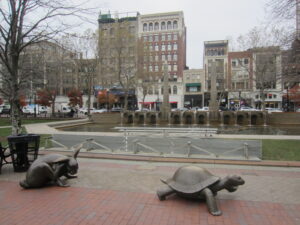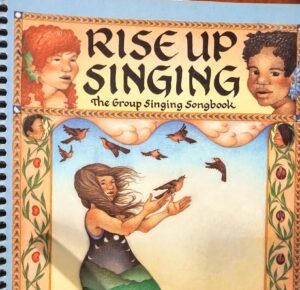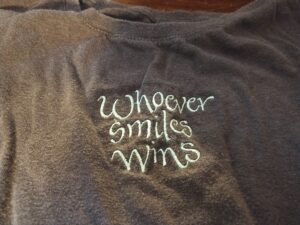As a child on Thanksgiving, one of the things I most looked forward to–after the turkey, the stuffing, and the apple pie–was “The Argument.”
It was kind of like a sport. On one side would be my grandfather and Aunt Rita. On the other side would be just about everyone else: my parents, our close family friends: Bill & Jo, and–to the extent we could participate–my brothers and me.
Though the details of the news cycle changed over the late 60s and early 70s, the overlying arguments were always the same. Should we be in Vietnam? And did nuclear proliferation make any sense at all?
If I already have enough bombs to destroy the world a million times, I remember my mother arguing. There’s no reason I need enough bombs to destroy the world two million times–no matter what Russia does.
At this point my grandpa or Aunt Rita would launch in about the evils of Communism: Russia, Red China, world take-overs.
No one was ever declared the winner or loser in these yearly arguments. It was just something we did before getting out the poker chips–where there would be winners and losers, but only for chips so it didn’t matter. And I don’t remember any real antipathy expressed against those who held a different opinion. No cutting remarks about “owning the liberals,” or accusations of racism, ignorance, or “wokeness.”
My grandfather was one of the kindest, most generous people I knew. So was Aunt Rita, a devout Catholic and an active member of the Republican Party for decades. She sent us all so many cards with checks in them, my father joked that she was running a foundation. And on a Thanksgiving Day several years later when my brother ratted me out for sleeping with my college boyfriend after I confronted him about stealing the cash in my jewelry box and everyone else reacted with stony shocked silence, it was Aunt Rita who took me aside, pressed a twenty-dollar bill in my hand, and told me that whatever people did in loving relationships was just fine.
So, of course, I’m thinking about all of this as we head into this year’s Thanksgiving. I’ve already had moments of drama and trauma with some extended family that have left me feeling far less generous and forgiving than Aunt Rita–or any of us–were during those long-ago arguments. And I’m personally not in a place to take the Pollyanna route and conclude with some cliché about how we need to love everyone, regardless of their ideology. No matter how well-meaning and caring some people might be in their personal lives, I can’t get past their enabling a leader who has built his whole campaign on hatred of others.
Yet, this doesn’t excuse those of us on “the blue team” from dismissing their concerns, or deriding them as human beings, no matter how “wrong” we might think they are. So this gets at the conundrum: how do we keep ourselves, those we love, and those groups of people whom we may not know but still care about, safe from the augmented rhetoric that has been fomented to target them.
I don’t know the answer, but I do know that as a fiction writer I’ve had to infiltrate the minds of some characters who are about as different from me as possible. And I’ve had to make them fully developed, with fears, aspirations, prejudices, dreams, secret fantasies. A standard concept in character development is that the reader only sees the part of the iceberg above the water, but in order to make the character and their motivations authentic, the writer has to know and fully understand everything underneath.
So, maybe part of the problem, regardless of which “side” one might be on, is that people aren’t seeing anything more than the tip of the iceberg.
What would it be like to treat the uncle who drives you crazy as an exercise in character development. There are many great lists of questions you can ask yourself about your character in order to understand him better, and hopefully gain some compassion so that if you were to write him in a scene, whether people liked him or not, there’d be something about him that would make your readers care.
And a braver step, if you happen to be sharing a Thanksgiving table, what would it be like to ask your uncle to do the same exercise for someone from a targeted group–a trans teenager, or a woman from Central America whose husband has just been killed by gangs and is now fleeing for her life.
As Arlo says, if just 50 people a day….maybe it’s a movement…
Happy Thanksgiving!

A Thanksgiving staple–my cranberry upside down cake. Photo by Shel Horowitz






